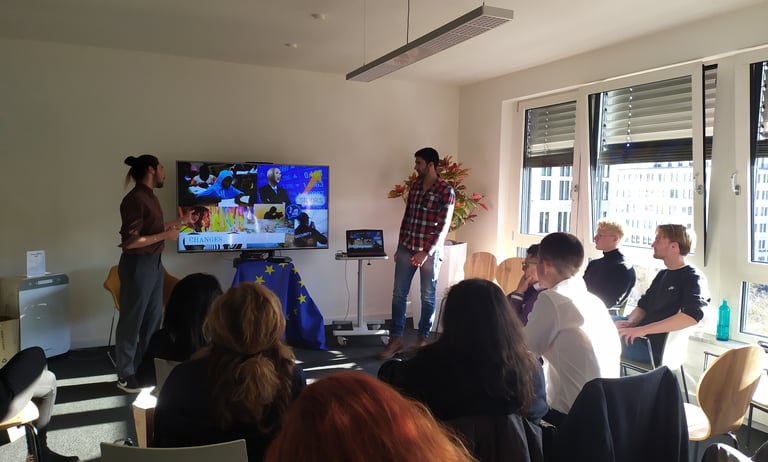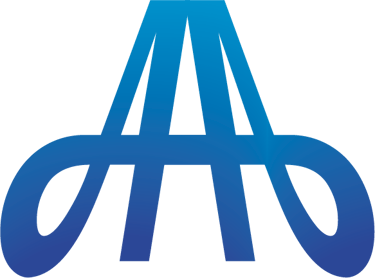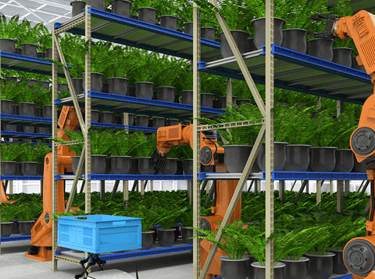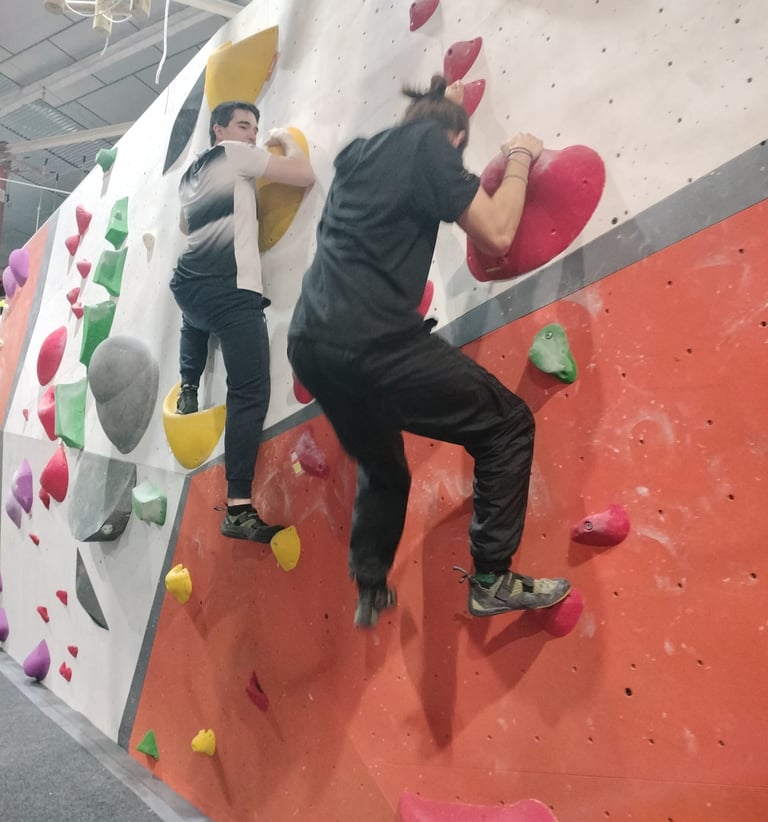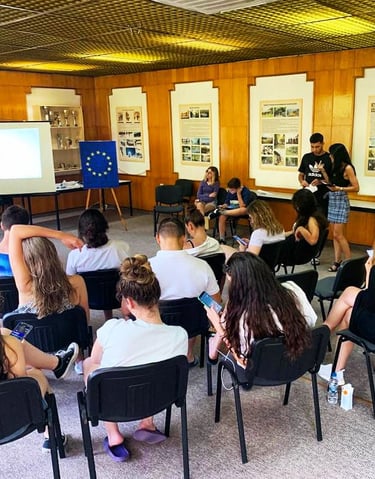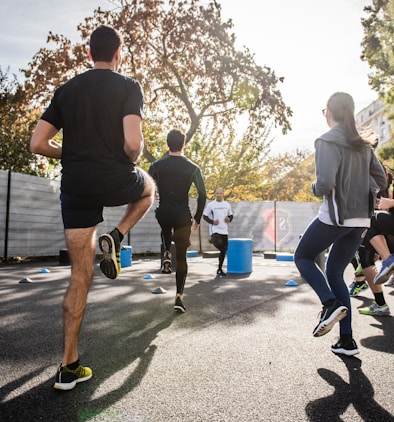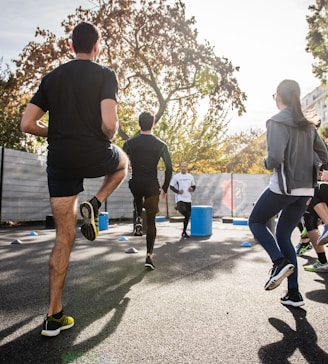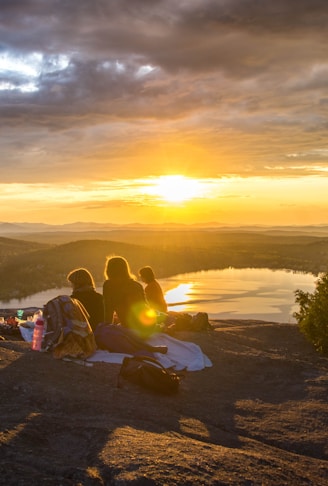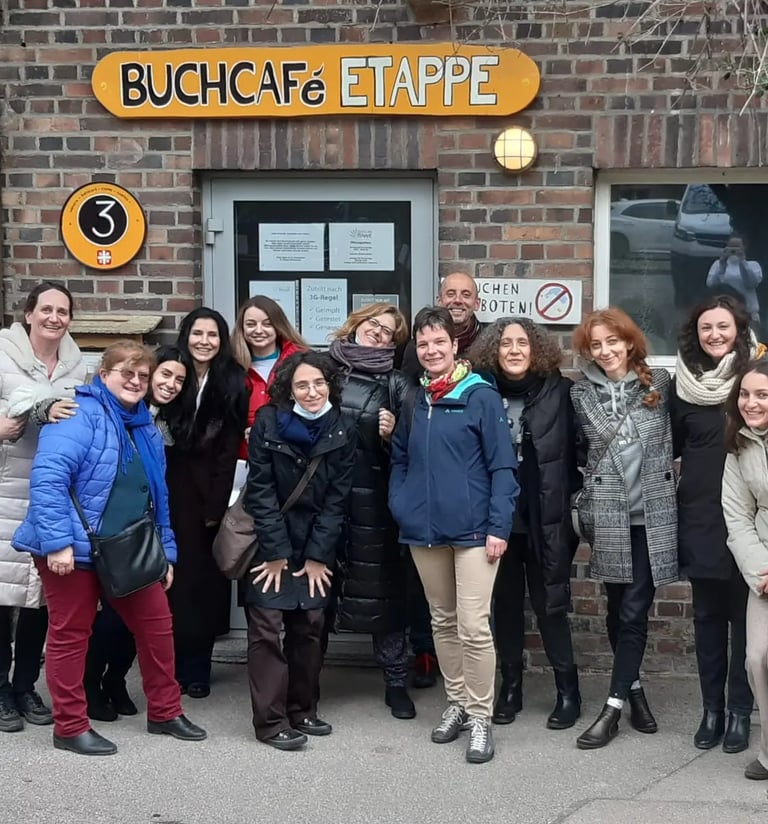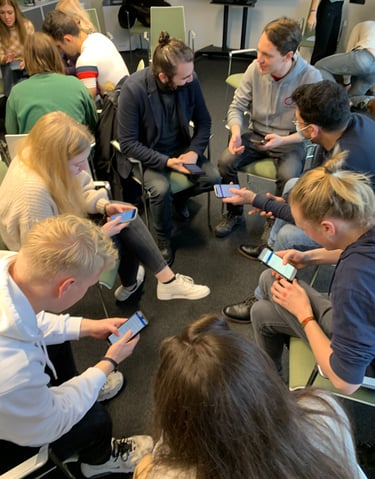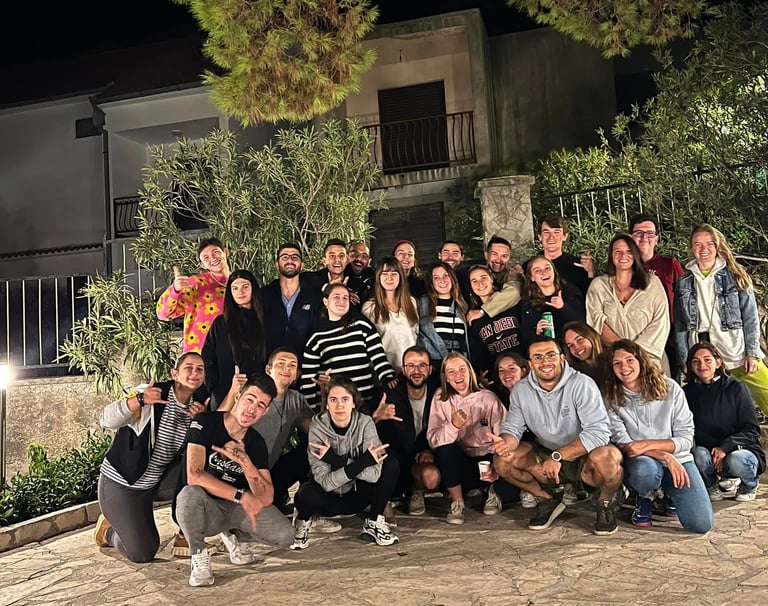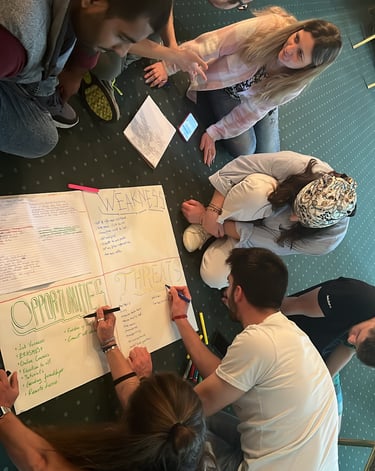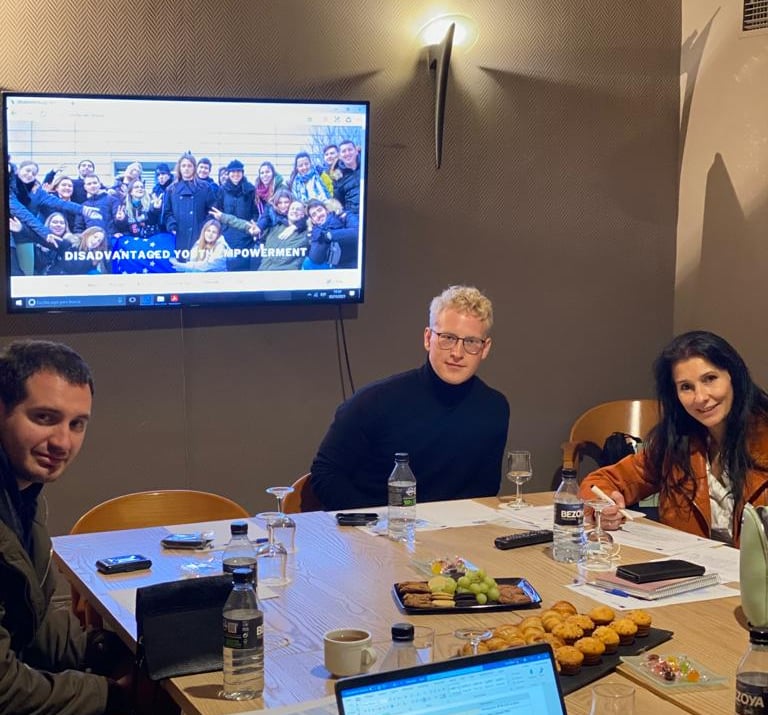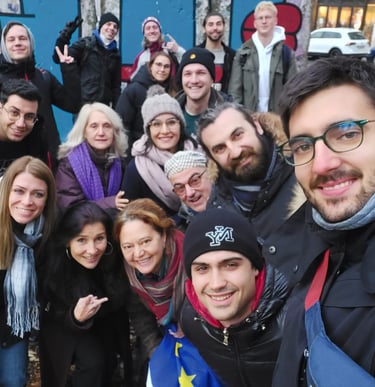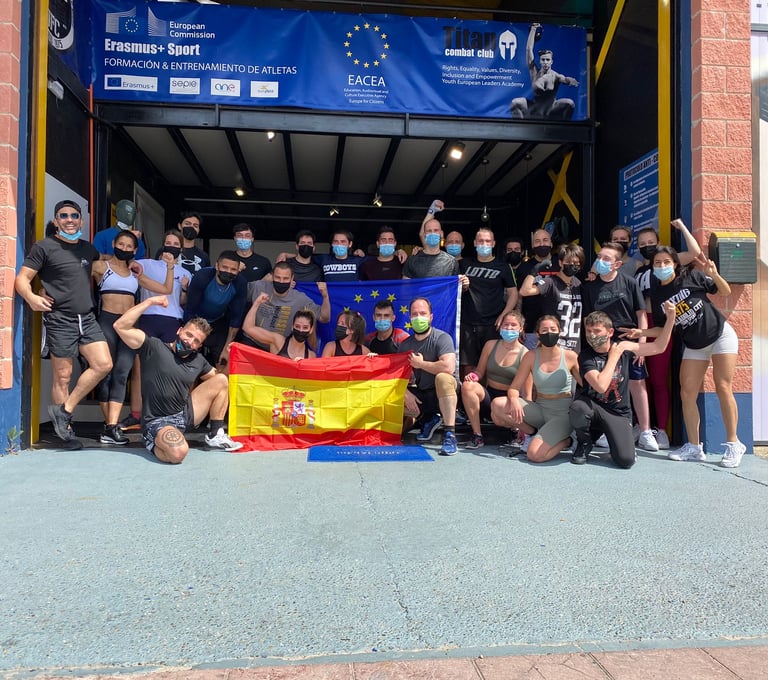These projects have been funded with support from the European Commission. The publications reflect the views only of the author, and the Commission cannot be held responsible for any use which may be made of the information contained therein.


WIRES project, Erasmus+ Programme
The WIRES project aims to empower rural women by enhancing their entrepreneurial skills, digital literacy and stress management capabilities. By implementing training programs and providing resources, the project will foster economic opportunities, promote gender equality and increase professional inclusion in rural areas of Germany, France and Spain. WIRES seeks to create long-term sustainable support systems and networks to help rural women succeed in entrepreneurship and community leadership.
In 18 months, the partners will implement joint staff training, local workshops for rural women, and interviews with successful rural businesswomen. They will also organize multiplier events to share the project outcomes, develop a toolkit for entrepreneurship, digital skills, and stress management, and launch a project website and social media campaigns. Additionally, the smooth project management and closing transnational meeting will ensure collaboration and sustainability beyond the project's duration.
WIRES is expected to empower rural women with entrepreneurial, digital & stress management skills. It will create a comprehensive training toolkit, increase visibility for rural women entrepreneurs, promote gender equality & enhance networking opportunities. More than 140 direct participants will be involved from Germany, France & Spain, while reaching approx. 3500 people indirectly, through interviews, events, website & social media, ensuring long-term impact through ongoing use of the project results.


Agrilearn, Erasmus+ Programme
The “Exploring new technologies to enhance the skills of people in rural areas, aiming to environmentally-friendly digital agriculture to tackle climate change” project is implemented in the Erasmus+ VET sector, with partners from Cyprus, Greece, Netherlands and Spain. The main objectives are:
Strengthen the European agriculture industry
Provide opportunities to isolated people in rural areas, who had fewer opportunities in life so far compared to others
Introduce the smart agriculture regime as an effective way to deal with climate change, all around the EU
Facilitate the adaption to smart agriculture and the adoption of envrionmentally-friendly technologies/methods
Design innovative, user-friendly VET training for strengthening the skills of producers/stakeholders, through which the user acceptance can also be enhanced
Design e-platform that will be maintained and available to producers/stakeholders during and after the completion of the project activities.
All involved project participants will increase their EU knowledge, competences, experience, perspectives, and personal networks.
Cultivating a Positive and Resilient Mental Health Environment in the European Youth Sector, Erasmus+ Programme, Mobility of Youth Workers
In cooperation with partners from Bulgaria, Czech Republic, Greece, Italy, Germany, Slovenia and Croatia, Alpha Centre took part in the international training "Cultivating a Positive and Resilient Mental Health Environment in the European Youth Sector".
The project consisted of a training course dedicated to youth workers and aimed to develop competencies in using non-formal education methods for the promotion of youth mental health.
In the training participants have increased their knowledge and the understanding of:
mental health as a positive resource and skill that youth workers could teach, learn, support, and strengthen
tools to promote the mental health of young people
how to raise a concern with a young person, how to support them and to find help if necessary
how a youth worker can have an important role in the promotion of mental health
how to plan and develop youth organizations to support the mental well-being of young people youth.
Citizens Clubs for European Integration & Learning,
Erasmus+ Programme
At these difficult times for Europe, the project's general objective is to contribute to the rural citizens' deeper understanding of the EU values, its history and diversity. Reflecting on the European citizenship identity through engaging in EU knowledge and learning people from different EU countries and rural zones, could help the citizens to understand better the Union policy-making process and promote opportunities for societal and intercultural engagement, and participation at Union level.
The partnership has planned activities at local/regional & European level which will help to get closer the rural people to the European idea, bridging the intercultural, intergenerational and social divide they're suffering. The rural citizens will be involved in thematic workshops, public debates, online seminars, video contest, multiplier events & drafting of Citizens' Paper. The follow-up activities will ensure the continuous rural world engagement with democratic participation and active citizenship.
Clubs4Europe will be a place where rural people from different parts of Europe can discuss, debate and plan their common EU idea. Rural citizens from Bulgaria, Slovakia and Spain will meet in Brussels to visit the EU institutions and get to know different thematic topics on the debate for the future of Europe. All involved project participants will increase their EU knowledge, competences, experience, perspectives, and personal networks.
EmployU project, Erasmus+ Programme
The EmployU project forms a small-scale partnership of 3 entities to support capacity-building of youth workers/coaches by creating, piloting & disseminating a training methodology, using the sport to strengthen the key competences and employability of marginalised young people in Bulgaria, Germany, Spain and across Europe. By applying the sports' values of equality, respect and empowerment in the youth work, the partners will create a bottom-up structure putting the young learners at its heart.
The main output will be online Training Toolbox for youth workers, offering training sessions to meet the needs of vulnerable young people, enhancing their basic skills and boosting their employability. Joint Staff Training will gather trainers from BG, DE and ES for capacity-building on the Education Through Sport approach, and total of 90 young people will be involved in workshops to test the developed methodology. Transnational meetings, focus groups & youth forums form part of the management, dissemination and follow-up activities.
As long-term benefits are expected the up-skilling and improved employability of marginalised young people in the 3 partners' regions and other EU countries, thanks to the transferability of the developed outputs; equipping youth workers with new tools, using ETS approach; supporting the social inclusion of vulnerable groups, providing quality tailored training with equal access to all; networking at European level for development of key competences and soft skills of the EU vulnerable youth.
Unser Land Europa, Erasmus+ Programme
Rural areas can be places that offer a wide range of leisure activities, but these areas often suffer from a poor supply of services. This can be problematic for adults in rural areas who are at greater risk of reduced mobility, lack of information or social exclusion. This often leads to fewer learning opportunities, more difficult access to education and training and a lack of knowledge about existing European programmes, relevant EU issues and policies.
In collaboration with partners from Germany and Bulgaria, Alpha Centre focused on the possibilities for creating learning opportunities on EU identity, civic engagement and participation in the democratic life in order to reach and achieve a greater impact on adults in rural areas. During the UnsEU project, the partnership will organize activities at local/regional level that will help adult learners to become active citizens who fully engage in the EU democracy process and participate in decision-making about the future of the Union.
The project aims to reach 300 citizens from 3 European regions with different backgrounds (age, social status, culture, religion). By working at local, regional and international levels, communicating, exchanging ideas and opinions and building consensus, these participants will get to know more about the EU integration during the planned in-situ and online events, and will be able to take an active part in the European democratic life.
New Ways to Inclusion through Circular Economy project, Erasmus+ Programme
The NICE project focuses on strengthening the cross-sectorial transnational cooperation that allows for greater synergies across different areas of actions that matter for marginalised adult learners promoting their employability and increasing quality and innovation in the adult education field.
The project idea is to develop businesses of circular economy as places for inclusion and sustainability by training adult education professionals and learners of adult education.
The training for adult education professionals in charge of the circular economy businesses covers: Marketing, sales and public relation competences to make the businesses attractive places in the community; Strategies and arguments to start and maintain cooperation with other branches and stakeholders in the community; Product design competencies to attract people from all income levels, not only disadvantaged people; Creating awareness-raising material, etc.
The training for adult learners covers: Becoming ambassadors for sustainability and circular economy; Inclusive activities linked to circular economy, marketing and communication skills, related to the circular economy.
Tailored and simplified training for digital marketing and e-commerce according to the needs of SMEs, Erasmus+ Programme
The 1ePoint project was implemented by three partners from Spain, Greece and Cyprus, an NGO, a research lab and a SME, aiming to upgrade the skills of SMEs owners and employees of the retail sector in the areas of business, financial management and digital marketing. 1ePoint aimed to address long-term needs of SMEs, arisen with the financial and COVID health crisis, where SMEs were unable to manage their finances or to create their e-shop due to lack of know-how cohesion.
The partners worked to adjust some training materials on business, finance, and digital marketing to the needs of the SMEs owners of the retail sector, providing them in 3 languages as OER. In total 93 SMEs owners and employees were involved in trainings to upgrade their skills so as their business to thrive. Additionally, an App was developed to further support the knowledge acquisition of the VET learners. Also, project management meetings and dissemination events took place in each partner country. 192 people were directly involved in the project activities, and approximately 3800 indirectly reached through the 1ePoint website, social media, press releases and awareness-raising events.
3D Future of EU, Erasmus+ Programme
EU Youth exchange promoting active youth participation at local and regional level.
Specific objectives:
To encourage EU citizens to make their voice count.
To build the capacity of young people to participate actively in the democratic life of Europe and counter the challenges of Euroscepticism.
To give voice to citizens by involving them in debate on forward-looking initiatives for the future of Europe, on what they perceive to be the urgent issues relevant to the development of Europe.
To build the capacity of civil society organisations to foster European citizenship though establishment of a flexible international network of active young citizens and constant dialogue with the institutions of the EU.
3e Project: Empower, Encourage, Engage, Erasmus+ Programme
The 3e project aimed to provide young people with skills and knowledge on pros and cons of digital tools, critical thinking and active engagement in community development.
During youth mobility in Greece, 30 young people from 10 countries expressed expectations regarding the content and the process of the programme; became familiar with the methods and principles of non-formal education. They got involved in decision-making process and quality elements of KA1 E+ projects. Participants from different cultural backgrounds made suggestions and exchanged experience during educational visits and special workshops.
Objectives were to train today’s youth on the uses of digital tools, their pros and cons; to develop constant critical thinking in both digital and non-digital forms; to make knowledgeable decisions independently, giving them the means to be the diligent and self-empowered actors of today’s society, to be able to connect and network responsibly and more widely, to become active citizens and become self confident in the community development, cultivating cultural awareness.
Disadvantaged Youth Empowerment, Erasmus+ Programme
The consortium brought together 4 organisations from Bulgaria, Croatia, Germany & Spain, each of them with specific expertise in the youth education field.
The project duration was 18 months, calculated in order to implement correctly the planned action and achieve the project objectives. Main activities were the development of Training Programme “Culture, Civics & Group Coaching for Disadvantaged Youth Empowerment” for youth educators in 5 languages; blended mobility where 24 young participants and youth workers from the partners' countries exchanged knowledge and jointly worked to develop the planned training units; pilot tests with 128 vulnerable young people in 4 EU Member States; local/regional dissemination events, where total of 146 representatives of the target groups assisted; creation of Youth Power cross-border cooperation Network, website and project social page.
Social inclusion of migrant women through art, sport, civic education & group coaching, Erasmus+ Programme
The 4women project was based on the partners' practices that using the civics, art and sport, and especially the benefits of self-defence training and group coaching, could help to bring people from various cultural and ethnic backgrounds together and can contribute to the integration and inclusion of women with migrant backgrounds and therefore to the community cohesion.
To this end, the project aimed to: Build a social integration model for migrant women linked with non-formal education and life-long learning methods; Exchange knowledge and transfer good practices among partners on art, sport, civic education and group coaching of vulnerable adults; Empower migrant women towards social inclusion, civic engagement and participation in the EU societies; Provide awareness raising opportunities for stakeholders and general public to support migrant women in their integration process; Promote intercultural dialogue and strengthen knowledge and acceptance of social, ethnic, linguistic and cultural diversity in society.
Citizens’ Forums for United Europe project, Europe for Citizens Programme
The "Citizens’ Forums for United Europe" project came to support all EU initiatives, aiming to respond better to the changing reality and to transform challenges into opportunities.
Our objective was to summarise the progress made in the 6 Member States (Bulgaria, Greece, Poland, Germany, Spain and Italy) on the White Paper on the Future of Europe, launched by the EC in 2017, to analyse the strengths and weaknesses in the local/regional policies and develop Citizens' Europe e-Paper, focusing on the opportunities for better EU future, suggested by citizens from 6 countries and different profiles, backgrounds and ages.
The project has directly involved 620 citizens in forums, debates and solidarity acts on the EU challenges, treating a special topic in each partner country: Competitive Europe in Poland, Migration & Security in Greece, Demography and Society in Spain, EU Communication in Italy, Digitalisation in Germany, Climate Change & Environment in Bulgaria. Approximately 6000 citizens have been reached indirectly through the project social media, awareness raising campaigns, video competition #unitedEurope on YouTube, local expositions and street events.
